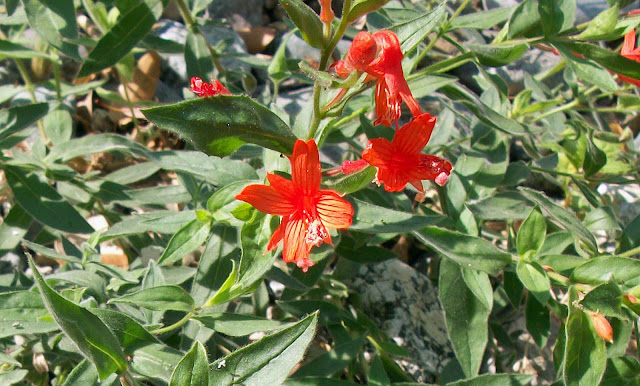Water levels have dropped even more, and the bigger plunge
pools have noticeably more resident rainbows living there. It’s so important
now to make your presentations in the pockets, pools, and slots that have a
depth greater than 2 feet. There has been a good deal of fishing pressure on
the weekends, but during the week it is extremely light. The fish have been
getting hammered in the more popular areas with easy river access, the more you
hike into the remote sections, the better the fishing. Water temperatures are
still very cool, yesterday in the upper reached was 56 at 8am rising to 62 by
1pm.
The early morning spinner fall of psudocleons (tiny BWO’s
#20-22) has intensified even more, you’ll see females punching through the
surface meniscus of the water as they scuba dive to the bottom to lay their
eggs around 9 to 10:30am. The dragonflies have keyed in on them too, and it’s
very entertaining watching them munch and crunch on the fly, in fact it’s
really cool. Hoppers are getting more attention, but the population is down
from years past, maybe the drought has had something to do with that. Ants
continue to be the trout’s favorite, they must taste good to those rainbows, I’ve tried
them and nearly puked – Not a good idea.
Big bushy dry flies in yellow, orange, or black with a
purple Psycho Prince ( #16), or ant (#12-16) trailer is receiving great results.
I’m starting to guide further down the canyon now in the mornings as both air
and water temperatures continue to fall, yet still above Downieville. Keep in
mind the water temps come up much more quickly in this section as it does not
have the abundance of springs as the upper section does. I’ll be scouting Lake
Davis in the weeks to come, and locating where the largest concentrations of
those big rainbows are cruising and feeding. Trips are starting to come, and I’m
booking dates. If you want in on the action, give me a call at 530.228.0487, or
shoot me an email at baiocchistroutfitters@yahoo.com.
Best of luck out there, absorb the beauty of the land, and live large.
California Fuchsia epilobium canum aka Hummingbird's Trumpet blooms late in the season after the summer heat has driven most other wildflowers to seed. It supplies hummingbirds with a huge supply of food for their start of the southward migration to South America.






















